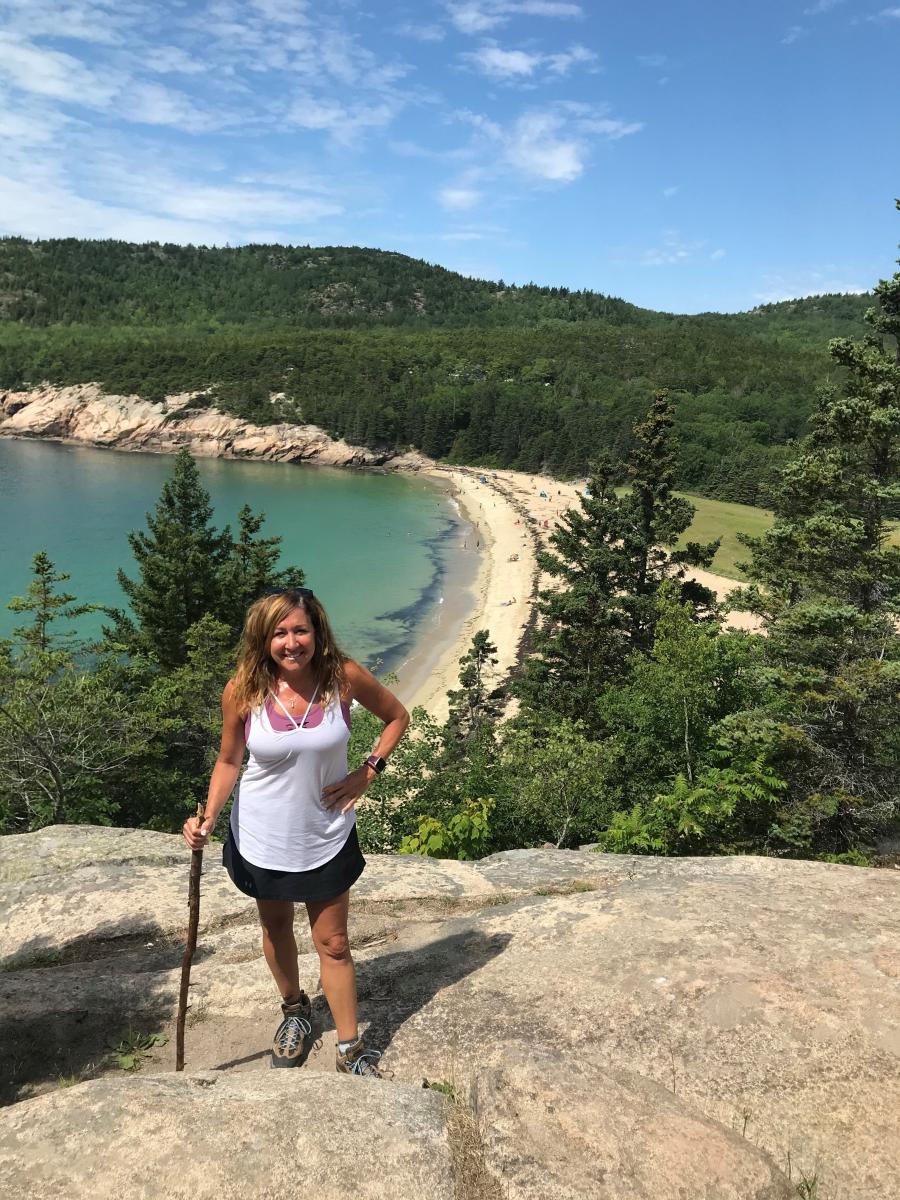“When you’re being treated in a cancer hospital, there are so many sick people and you know you’re not the only one battling the disease. To have felt so special and cared for at Fox Chase was absolutely amazing.”‐Alisa Monteiro
As someone who works in oncology clinical trials, I’m pretty familiar with hospitals and medical centers in the Philadelphia area and what their specialties are when it comes to cancer. Still, at the age of 52, I did not expect to be diagnosed with a neuroendocrine tumor, also known as NET, and be faced with the decision of where to go to receive the best treatment.
Luckily, Fox Chase Cancer Center’s team of dedicated doctors are particularly skilled when it comes to this rare cancer, which made my decision on where to have surgery that much easier.
Routine Procedure, Surprising Results
My first symptoms were abdominal pains that occurred on and off for about a year. At first, many doctors attributed my pains to menopause, but I had gotten a few ultrasounds and other tests, none of which revealed anything out of the ordinary.
In May 2021, I went for a routine colonoscopy. During the procedure, my doctor had been taking a picture of the valve between the small and large intestine and noticed a tumor about the size of a cranberry in my small intestine. She took a biopsy of the tumor, and a few days later I was diagnosed with stage III NET.

I experienced so many emotions when I got the news. I was angry, I was scared, and I just couldn’t believe that I had cancer. Perhaps it’s because of the field I work in or my fact-finding nature, but I drove myself crazy researching NETs following my diagnosis. The frustrating part was that I found that the statistics for treatment and survival were inconsistent with this type of cancer because it’s rare and it depends on where the tumors are located.
I began doing my research on where to go for a consultation and found that Fox Chase had an entire neuroendocrine team. Once I got in touch with them, I had an appointment for the following week.
Discovering the Fox Chase Difference
The first person I met with was Dr. Sanjay Reddy, a surgical oncologist, who immediately ordered a carcinoid tumor PET scan. Results from the scan showed that my tumor had not spread to other areas, with the exception of a few lymph nodes around the tumor. I then learned that I would have to have surgery to treat the cancer.
On June 15, I was scheduled to receive a full resection surgery in which doctors removed a section of my small and large intestine and reconnected them. During the surgery, doctors removed seven lymph nodes, three of which had cancer.
Throughout this process, I was scared because it was really the only surgery I had ever had, but Dr. Reddy and his entire team made me feel at ease. He was honest and upfront and just exuded confidence. In addition, I met with Dr. Namrata Vijayvergia, assistant chief of gastrointestinal medical oncology, which was equally comforting. Discussing my diagnosis, stage of disease, and location of my tumor with her made me feel comfortable with our plan.
Perhaps what impressed me most was that despite how busy I know Dr. Reddy is, he still came in to see me every morning and night after surgery. He even took my partner’s phone number before I went into surgery so that he could call him to let him know how I was doing.
When you’re being treated in a cancer hospital, there are so many sick people and you know you’re not the only one battling the disease. To have felt so special and cared for at Fox Chase was absolutely amazing.
I was very fortunate that surgery was the only treatment I had to experience. The type of cancer I had did not require any chemotherapy or radiation, and once the surgery was over, I could focus on my recovery.
Life After Cancer

The days after surgery were as smooth as could be. Dr. Reddy had me up and making my way around the center the night after my surgery. Everything went so well. He told me I would be in the hospital for five to seven days, but I was home in three. Other than soreness in the incision area, I have had absolutely no side effects. Dr. Reddy had to remind me to keep my activity to a minimum despite how great I felt.
I did so well that after a few months, it’s almost like it never happened, even for my family. I think we’ve been fortunate in that with my type of cancer, surgery was the only real treatment. Although a cancer diagnosis is still scary for everyone, my family and I never had to go through the active treatment portion of my cancer journey where I would look different or feel sick. That, I think, can sometimes be one of the most difficult parts for cancer patients.
Now that my recovery is pretty much over, I’m back to doing what I love, like working out and golfing. I also finally got back to dragon-boat paddling in August, which is something I’ve always enjoyed. Even my follow-up schedule is better than expected. I’m required to come back to Fox Chase twice a year for scans to check for any recurrences.
Despite the relative ease of my treatment, it made me think of life much differently. I don’t know if this will come back; it could recur at any time in any location. This experience has made me focus more on the things I want to accomplish and the people I want to spend time with.
From my experience, I would tell people that if something doesn’t feel right in your body, keep pushing to find out what it is. I would have never thought this would be my story, but at Fox Chase I got the best care. The staff all work so hard to minimize the impact of treatment for you. I would recommend Fox Chase to anyone faced with a cancer diagnosis. You’ll be in the best hands.
Learn more about treatment for neuroendocrine tumors at Fox Chase Cancer Center.